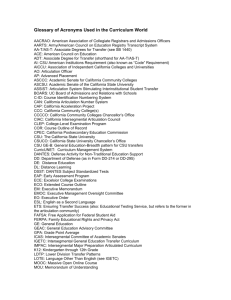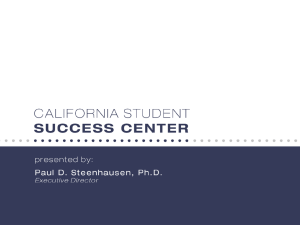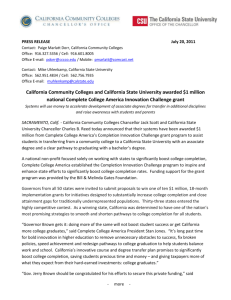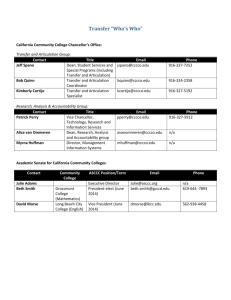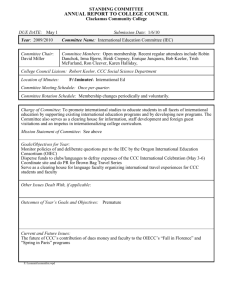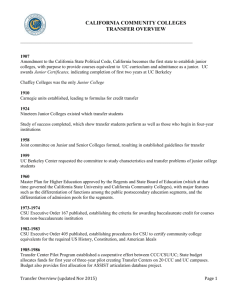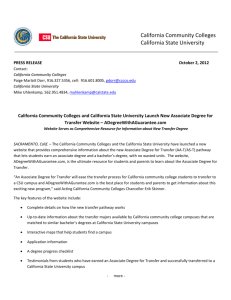Minutes: AO Regional Representatives Meeting October 9, 2008
advertisement
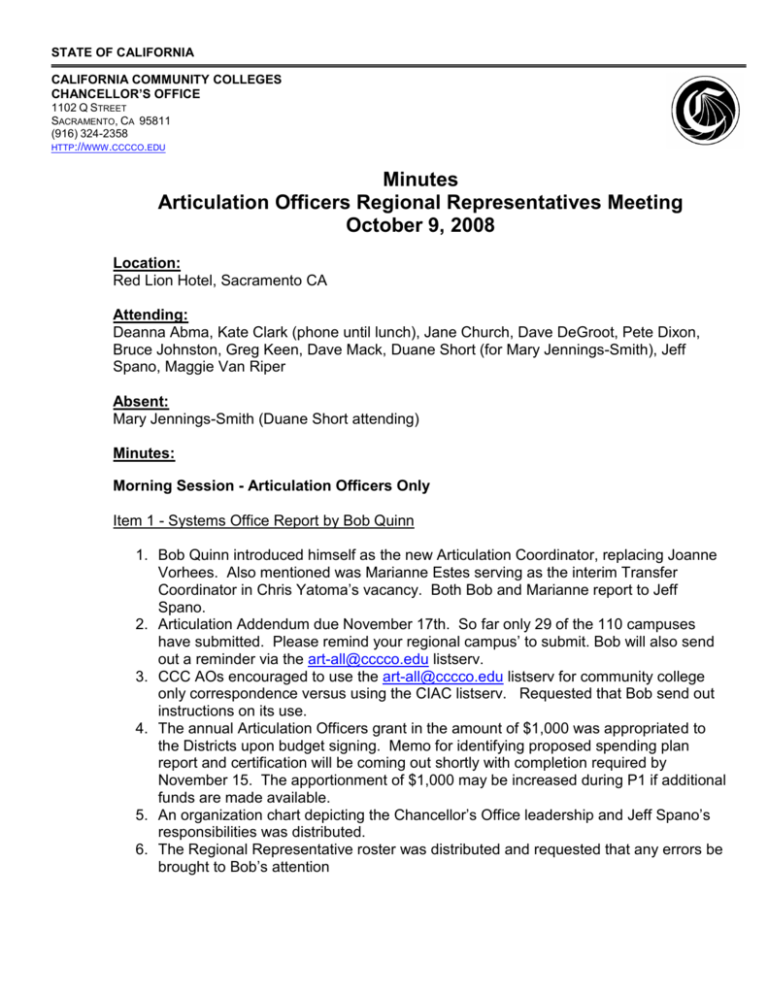
STATE OF CALIFORNIA CALIFORNIA COMMUNITY COLLEGES CHANCELLOR’S OFFICE 1102 Q STREET SACRAMENTO, CA 95811 (916) 324-2358 HTTP://WWW .CCCCO.EDU Minutes Articulation Officers Regional Representatives Meeting October 9, 2008 Location: Red Lion Hotel, Sacramento CA Attending: Deanna Abma, Kate Clark (phone until lunch), Jane Church, Dave DeGroot, Pete Dixon, Bruce Johnston, Greg Keen, Dave Mack, Duane Short (for Mary Jennings-Smith), Jeff Spano, Maggie Van Riper Absent: Mary Jennings-Smith (Duane Short attending) Minutes: Morning Session - Articulation Officers Only Item 1 - Systems Office Report by Bob Quinn 1. Bob Quinn introduced himself as the new Articulation Coordinator, replacing Joanne Vorhees. Also mentioned was Marianne Estes serving as the interim Transfer Coordinator in Chris Yatoma’s vacancy. Both Bob and Marianne report to Jeff Spano. 2. Articulation Addendum due November 17th. So far only 29 of the 110 campuses have submitted. Please remind your regional campus’ to submit. Bob will also send out a reminder via the art-all@cccco.edu listserv. 3. CCC AOs encouraged to use the art-all@cccco.edu listserv for community college only correspondence versus using the CIAC listserv. Requested that Bob send out instructions on its use. 4. The annual Articulation Officers grant in the amount of $1,000 was appropriated to the Districts upon budget signing. Memo for identifying proposed spending plan report and certification will be coming out shortly with completion required by November 15. The apportionment of $1,000 may be increased during P1 if additional funds are made available. 5. An organization chart depicting the Chancellor’s Office leadership and Jeff Spano’s responsibilities was distributed. 6. The Regional Representative roster was distributed and requested that any errors be brought to Bob’s attention STATE OF CALIFORNIA CALIFORNIA COMMUNITY COLLEGES CHANCELLOR’S OFFICE 1102 Q STREET SACRAMENTO, CA 95811 (916) 324-2358 HTTP://WWW .CCCCO.EDU 7. Also related to the roster Bob asked that any Regional Representation changes be brought to his attention. At the time both Deanna Abma and Jane Church mentioned they will be transitioning out. Item 2 – ASSIST Update by Jeff Spano 1. Governance changes are in place at ASSIST. Related to primary oversight is an Executive Management Oversight Committee (EMOC) consisting of Jeff Spano from CCCCO, Rachel Hendrickson from CSUCO, and Sue Wilbur from UCOP. The EMOC once to twice a month to discuss ASSIST related issues and initiatives. Under the EMOC is an ASSIST advisory team of intersegmental representatives from different roles throughout the colleges. This team meets twice per year and met the first time this August. 2. Staffing changes have also occurred at ASSIST. Several programmers have left and have been replaced by contract programmers working out of UCOP and supervised by Jane Meyer of UCOP and a member of the ASSIST Technical Advisory Committee. Eric Taggert and Larry Coon have voluntarily left ASSIST and there are no plans to replace either at this time. 3. Hardware was upgraded and a new hosting center, NACS at UC Irvine, was selected. All hardware and network infrastructure is now supported by NACS. 4. A software upgrade is the next pending initiative at ASSIST. Currently the software relies on old Java technology and is no longer supported by Microsoft. A “Vision” meeting was held in Oakland in May to discuss the guiding principles, scope, and functional needs of ASSIST into the future. Next a consultant will be contracted to help develop requirements specifications with input from a project advisory team (to be formed still). The requirements specifications will be then put out to bid. This redesign is expected to cost two million dollars and take a few years to implement. 5. The ACS site in Irvine was relocated and is now adjacent to the campus at the Center for Educational Partnerships Building. Item 3 – Regional Issues (ALL) 1. CAN a. Considerable discussion on this topic, primarily the contradiction between the numbers usefulness and the fact they are not maintained. The general consensus among us AOs was as follows: i. Advise recommending their discontinuance in catalogues after Spring 2009; ii. Continue using them locally for advisement purposes to help students find similar courses on other campuses as needed; iii. Voluntarily remove our courses from the CAN list if they are no longer consistent with those dated CAN descriptors; and STATE OF CALIFORNIA CALIFORNIA COMMUNITY COLLEGES CHANCELLOR’S OFFICE 1102 Q STREET SACRAMENTO, CA 95811 (916) 324-2358 HTTP://WWW .CCCCO.EDU iv. Ask for an updated listing of CAN courses. AO reps ready to vote CAN #'s out of catalog starting 09-10 catalog. Decided to wait for confirmation from CSU LDTP tomorrow at NCIAC as to when CAN is being sun-setted for LDTP - is it S09 or two years from when descriptors are posted. b. Dave Mack volunteered to draft a system wide message which after review would be distributed. 2. C-ID a. Request to encourage our appropriate faculty to go to the C-ID website (www.c-id.net) to review learn about C-ID and, most importantly, review course descriptors and provide feedback. The course descriptors have been developed inter-segmentally with CCC, CSU and UC faculty working together. b. It was requested we invite Michelle Pilati (C-ID Chair) to the next regional reps meeting. 3. Second Semester Composition Course for IGETC Certification a. The general response was to indicate it as one of two possible courses not being certified under the new partial certification and allow the UC the make the determination, warning the student that there may be some difficulty. Kate will ask the question further at upcoming UCI workshops. 4. Question regarding policy on faculty written textbooks a. Decided the question is best posed to other AOs using art-all. Kate will pursue with her regional requester. Item 4 - System Level Response to Out-Of-State Requests for Articulations, Transfer Agreements, MOUs, etc 1. Much discussion about how so many want Associate Degree only as transfer preparedness and how it is not appropriate for CCC graduates. Many nationals consider students completing their IGETC has therefore completed their core curriculum. It was noted the system has 100,000 students that transfer out of state. 2. It was noted that the Academic Senate has a subcommittee on Statewide Transfer & Articulation. Take it there? 3. It was also noted that the Dallas CC System has a packet and a model to possibly benchmark. 4. Next Steps: a. Kate to come up with some recommendations for national groups to work with. b. Attempt to get resolution from ASCCC and by in from CSSOs. c. Verify CCC Chancellor’s Office support via funding meeting expenses etc. d. Group consensus to bring together AOs (Bernie Day, Deanna Abma & Kate Clark) and Transfer Center Directors to work on proposed language and possible CSU GE/IGETC type templates for articulation agreements with outof-state institutions. STATE OF CALIFORNIA CALIFORNIA COMMUNITY COLLEGES CHANCELLOR’S OFFICE 1102 Q STREET SACRAMENTO, CA 95811 (916) 324-2358 HTTP://WWW .CCCCO.EDU Item 5 - CCC GE AP List Progress Report – Dave DeGroot 1. Due to agenda time constraints this topic was limited to a handout only Item 6 - Associate Programs – Stephanie Low 1. Handouts provided by Stephanie 2. Stephanie recapped her item via a post session email: The Inventory of Approved Programs has a field for “transfer status” of credit programs. While we have been reviewing applications to revise non-compliant degrees, we have been very careful to enter the transfer status of the existing, non-compliant degree into this field for the revised degree. This activity brought to our attention that many colleges were not aware of this field in the inventory or what its values mean, and as a result, we started to pay closer attention to the catalog language used to describe students’ options for general education patterns in order to be sure that students are given information about selecting the appropriate GE pattern if they intend to transfer. Our approach has been that if a proposed degree is intended for transfer, then we are requesting that the college develop and propose language that recommends the CSUGE or IGETC pattern for students who intend to transfer, with a strong statement that advises students to select the appropriate pattern with assistance from a counselor. When the proposed degree is not intended for transfer, then the local GE pattern has been allowed. Exceptions are made when the major or area of emphasis requires a large number of units in lower-division preparation coursework, in which case the degree description needs to explain this, after which the local GE pattern is allowed. Proposal: The System Office will approve two degrees when colleges want to give students options based on individual academic goals. One degree will be given transfer status (with proper documentation as required) and will include the recommendation to complete either CSUGE or IGETC, with advice from a counselor. The other degree will not have transfer status and will allow students to complete the local GE pattern. Both degrees can be submitted with a single application. However, the two degrees will be entered separately into the inventory and will be assigned separate unique codes. It will not be necessary for colleges to list both degrees in catalogs, unless there are differences in the major or area of emphasis requirements. This degree structure was approved for revised degrees at the colleges in Ventura CCD, so you can see what the listing looks like on the inventory for Moorpark, Oxnard or Ventura College. The degrees are listed in the 49 T.O.P. category (4901.00, 4901.10, etc.). We’d like feedback about this issue. Does this really matter on your campus? Are there consequences that we have not considered? Will your college have the resources to track whether a student is awarded the non-transfer or transfer degree? Afternoon Session – Joint Session with Articulation Officers and Transfer Center Directors Item 7 - MAP Systemwide Feasibility Study Presentation STATE OF CALIFORNIA CALIFORNIA COMMUNITY COLLEGES CHANCELLOR’S OFFICE 1102 Q STREET SACRAMENTO, CA 95811 (916) 324-2358 HTTP://WWW .CCCCO.EDU 1. Presentation by Jim Gaston, IT Associate Director, SOCCCD 2. MAP is an online transfer planning tool for use by students. MAP identifies courses taken by a student, courses required per the selected transfer institution, and courses that still need to be taken. The student can then store and take that plan to a counselor for verification. More information is at www.socccd.edu/map 3. The CCC Chancellor’s Office is currently supporting a one time grant awarded to SOCCCD to investigate whether the MAP product has system wide applicability. If feasible, it would be developed to integrate with Banner, PeopleSoft, and Datatel applications. Colleges could opt in for use. 4. A report on the outcome of the grant study is expected Spring 2009. Item 8 - Legislative Update by Dave DeGroot and Roberta DelRosario 1. It was mentioned that both Dave and Roberta were stepping down in their liaison role, and replacements would need to be identified. 2. Dave mentioned Concurrent enrollment was extended as is - didn't loose it, but not what Portantino wanted. So, he'll be back trying to expand it. 3. It was also mentioned that gains were made for students that can take advantage of exemptions of the 5% rule during the summer - look at bill. 4. Dave notes there was nothing significant to report from his legislative 'networking' visits yesterday . . . keeping the door open! Item 9 - CSU LDTP Discussion (ALL) 1. Report from Jeff Spanos of the CSU LDTP summit held October 8th in Long Beach to see what can be done to get the CCC to engage in partnership. CCC was represented by Mark Wade Lieu, Jane Patton, Jeff Spano, and Michelle Pilati. Again, our CCC reps expressed our concerns, especially SDSU concern. CSU claimed no promotion on their part for SDSU Accountancy type articulations, but that it is up to faculty to determine how they articulate. Jeff felt good conversations, but . . . 2. After Jeff's presentation he had to leave. Much discussion occurred on the subject much of what we have said for years. However, some AOs that have been very opposed to LDTP are starting to participate 3. Those of us that are still advocating holding out suggested to our AO rep, Deanna Abma, on the LDTP Advisory Board (meeting next month) that if CSU would: a. Commit to adding the LDTP articulations to existing campus-to-campus articulations vs. deleting them in favor of the LDTP articulation agreements (repeal SDSU Accountancy) and b. Publish TCSU numbers and list which CSU Campuses will accept them CCC articulation officers would engage in the LDTP process. Meeting Concluded at 3:00 pm
